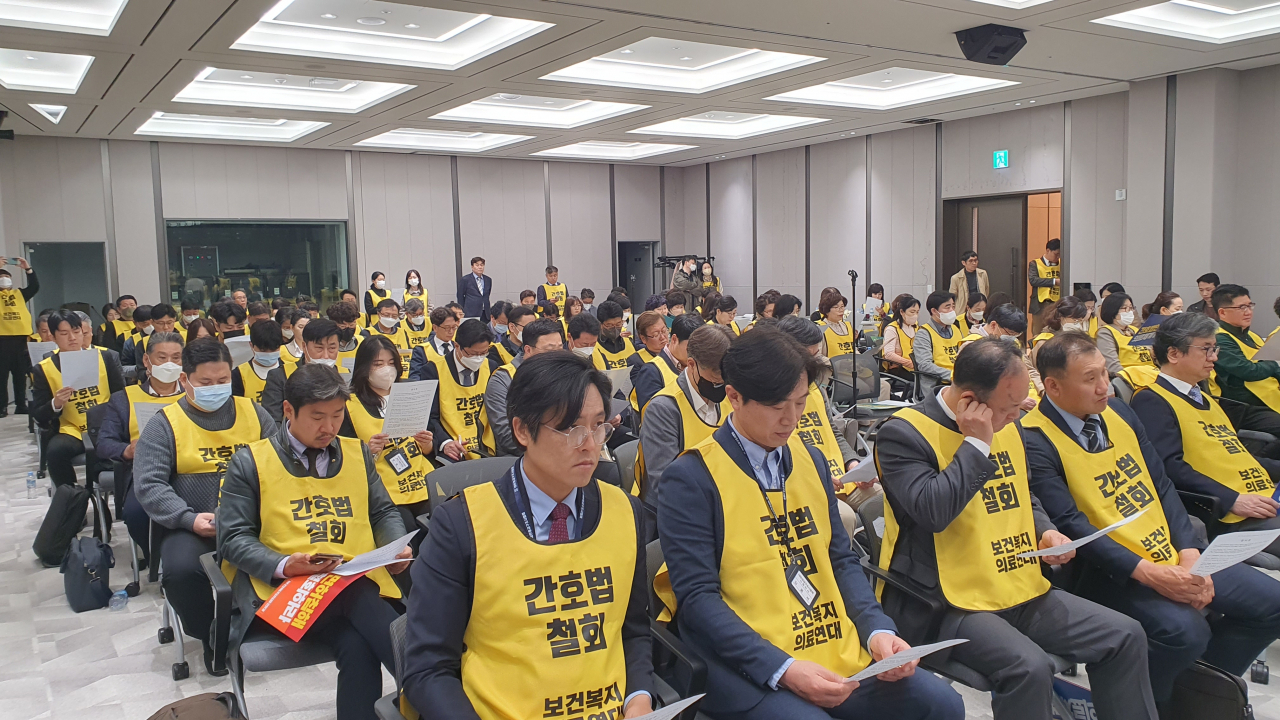Govt. to mediate over nursing bill as strike looms
By Son Ji-hyoungPublished : April 9, 2023 - 15:11

A coalition of South Korean medical technicians and doctors’ rights activist groups is considering a strike, as long-awaited bills aimed at easing nursing regulations and banning convicted doctors from returning to work are to be tabled at the National Assembly as early as Thursday.
A spokesperson of the ruling People Power Party Yoo Sang-bum said Sunday the government and the PPP would try to find a middle ground after collecting opinions of the parties concerned, with a special committee kicking off Tuesday.
The announcement came immediately after President Yoon Suk Yeol's office, the government and the ruling People Power Party held a high-ranking official meeting behind closed doors to discuss the matter at 1:30 p.m. Sunday at Prime Minister Han Duck-soo's office in Seoul.
Earlier on Saturday, 13 interest groups, together representing some 4 million medical professionals -- including physicians, dentists, emergency medical technicians, caregivers and medical information administrators -- revealed that they were planning to stage a hunger strike should the bills pass at the plenary session of the nation's parliament.
The coalition is also poised to carry out a demonstration against the new bills near Seoul City Hall on April 16.
The groups will begin discussing over whether to go on an all-out strike later this month.
Doctors' groups have claimed that the upcoming bills will lead to confusion in the national medical system over who is responsible for different services. They claim the main opposition Democratic Party of Korea, which controls a legislative majority, has been passing the bills without "democratic procedures," according to the coalition's statement.
The gist of the proposed nursing bill is to guarantee access to nursing services in the community -- care at home, for example. It stipulates the creation of regional support centers for community nursing and defines the roles and responsibilities of licensed nurses, which had formerly been stipulated in the Medical Service Act, in a separate set of rules.
The coalition says that the bill could pit nurses against medical technicians and doctors, as it allows community-based nursing services without the supervision of doctors. This could result in their range of activities overlapping with that of medical technicians, it says, creating confusion over who is responsible.
In Korea, nurses have long been forced to perform strictly under the guidance of a medical doctor.
Nurses' groups support the bills, saying it reflects changes in their work environments, and the bill’s passage was among Yoon's presidential election pledges.
Another bill to be presented in the plenary session is a revision of the Medical Service Act that would deprive doctors of their licenses if they been convicted of crimes unrelated to their medical practices, such as sexual assault, murder or other forms of violent crime.
The Korean Medical Association said in a statement the parliament is "moving backward ignoring the rights of citizens."
The bills were proposed in 2020 and 2021, fast-tracked at the National Assembly and were submitted to the plenary session on March 23.
"We urge the president to exercise his veto power," the coalition said in a statement on Saturday.
Yoo of the PPP, however, said that Yoon's exercise of veto power is not being considered at this moment.
Yoon vetoed a bill on Tuesday to revise the main opposition-led Grain Management Act, which would have increased government purchases of excess grain to shore up prices. It was the first presidential veto exercised in seven years, and the first bill that Yoon has vetoed.











![[Hello India] Hyundai Motor vows to boost 'clean mobility' in India](http://res.heraldm.com/phpwas/restmb_idxmake.php?idx=644&simg=/content/image/2024/04/25/20240425050672_0.jpg&u=)








